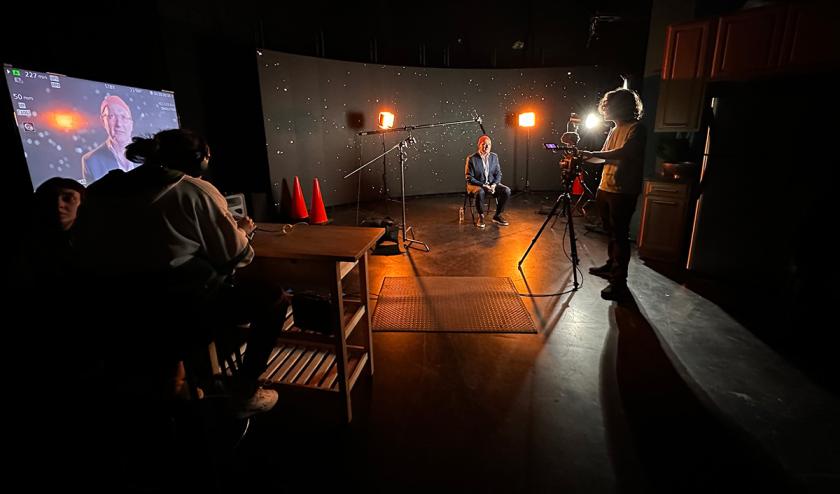For generations, humans have looked to the stars to know more about the immense forces that inform the totality of existence. As part of a new interdisciplinary project in the Mike Curb College, faculty and students will “boldly go where no one has gone before,” partnering with scientists at NASA’s Jet Propulsion Laboratory to produce a documentary about the Solar Gravitational Lens mission.
In the summer of 2022, Jared Rappaport, Chair of the Department of Cinema and Television Arts (CTVA), was approached by the NASA Solar Gravitational Lens mission team to create a student-led, faculty-supervised documentary. The timing was perfect, as Dean Dan Hosken had recently launched an interdisciplinary grants initiative to inspire and support new projects and classes that would put multiple areas of our college in collaborative conversation. This opportunity sparked a partnership between three recent CTVA faculty arrivals: Judy Korin, Assistant Professor in the Documentary Television Production option; Martin Jarmick, Assistant Professor in the Emerging Media Production option; and Kyle Simpson, Assistant Professor of Music and Chair of Music Composition. Their goal was to find distinct and intersecting ways to tell the visual story of this exciting mission, which proposes to make high-resolution photographs of planets in Earth’s galaxy with the potential capacity to sustain life, perhaps answering the eternal question of whether or not we are truly alone in this galaxy.
By using the phenomenon known as gravitational lensing, whereby the gravitational pull of massive celestial objects distorts and magnifies passing light, they hope to directly image planets that compositionally resonate with Earth. Dr. Debi Prasad Choudhary, Professor and Chair of CSUN’s Department of Physics and Astronomy, came on board to help students understand this complicated topic and convey the impact of the proposed mission. He walked them through the foundational science underpinning this goal, and demonstrated how scientists proved this technique could work by viewing a star directly behind the sun when direct light was blocked by a solar eclipse.
From there, CTVA students developed and pitched concepts for the film, convened creative development conversations, and made all filming arrangements with the principal investigator of the mission, NASA/JPL scientist Dr. Slava Turyshev. The team quickly realized that VFX/animation students would be critical to illustrate the potential worlds that lived only in their imaginations at this juncture. Though their creative work wasn't anticipated in the grant proposal, Animation professors Mark Farquhar and Caleb Owens eagerly came aboard, gathering a skilled team of Animation students who could deliver project assets on a tight deadline. One intriguing aspect of student participation in this project is the trans-generational nature of the mission. Dr. Turyshev recognizes that the time needed to develop this imaging technology, position it in space, gather and process data, and present findings will exceed his lifetime, and potentially that of younger scientists who will continue the mission. By documenting the conception and initiation of this mission, CSUN students are helping to archive this period and generate interest among the future generation who will finally usher Dr. Turyshev’s vision to its conclusion.

Dr. Slava Turyshev discusses the project with CTVA students. Image courtesy of David Imani.
To complete this 10- to 20-minute documentary, five students in the Documentary Television thesis class are collaborating with students in Animation, Music, and Graphic Design to create elements of the film. To help explain the mission and create tools to visualize its impact, Emerging Media Production students developed virtual renderings, while Animation students illustrated additional segments critical to the project's aims. Documentary Television students filmed Emerging Media students’ presentation of this interactive work in progress to Dr. Turyshev. Professor Korin shared that “students are learning every aspect of documentary storytelling and collaboration through this process and working at a professional level both creatively and logistically. It is a huge opportunity for them, and they have embraced it with passion and skill!”
Faculty colleagues across the Mike Curb College have enthusiastically led their students in contributing to this multidisciplinary endeavor. In the art department, Professor Mark Farquhar’s Animation students are creating sophisticated computer-generated imagery for the film, while Professor Joe Bautista's students are designing the poster key art. In the music department, Kyle Simpson's students are composing an original score for the film. Meanwhile, CTVA professors Dianah Wynter and Allesandro Jacchia spearheaded efforts to acquire a new LED production wall, or Volume, allowing production students to create and film on virtual sets in our TV studio. The model installed at CSUN is the same tool used to realize the striking imagined world of The Mandalorian. The JPL/NASA documentary is the first project for which students have had access to this cutting-edge technology, filming interview segments and b-roll footage using the LED wall, assisted by CTVA technology expert William Wilson. As you can see in the following images, the spectacular visual impact of the LED wall helps to more fully convey the gravity (pun intended) of this mission.


Images courtesy of David Imani, from the CSUN TV/Documentary "Eye of the Sun"
Nearing the end of the spring semester, principal photography is complete and the students are very busy with post-production. The film is anticipated to be finished during the fall semester. The film continues to serve as an incredible learning experience for all involved, and there are plans to tour the film in the festival circuit when complete, lending CSUN students and CTVA’s production degree programs increased visibility. We can’t wait to show you this incredible project in the coming year.







